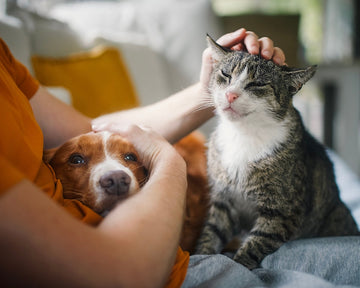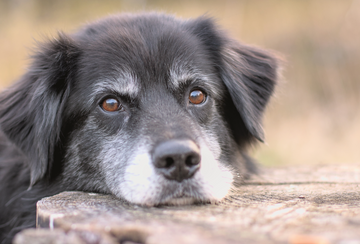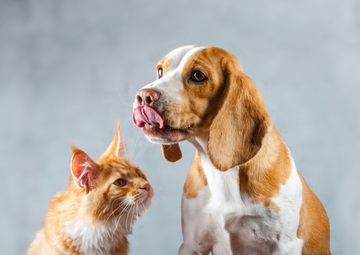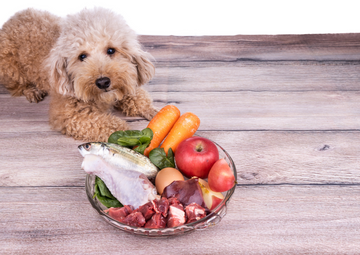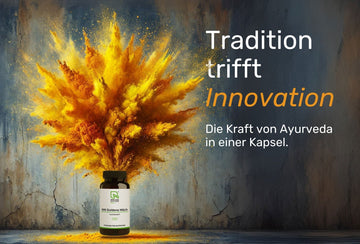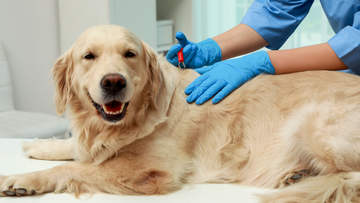As responsible pet owners, the well-being of our four-legged friends is of utmost importance to us. Good digestion is a crucial factor for the overall well-being of dogs and cats. When our pet suddenly has diarrhea or is constipated, we worry and often feel helpless. In this article, we want to help you better understand the causes and symptoms of digestive problems in dogs and cats and provide you with practical tips on how to help your pet.
1. The digestive system of dogs and cats
Structure of the digestive system
The digestive systems of dogs and cats are relatively similar, but there are a few significant differences. In both species, it consists of various organs that work in perfect harmony to absorb nutrients from food and excrete waste.
-
Mouth: Dogs ingest food with the help of their tongue and teeth, with the teeth primarily serving to hold and tear food. They rarely chew their food, but rather swallow it. Cats are similar; they also chew relatively little compared to us. Unlike humans, digestion in dogs and cats does not begin in the mouth, as they lack digestive enzymes in their saliva.
-
Esophagus: Swallowed food is transported through the esophagus into the stomach.
-
Stomach: In the stomach, food is mixed with gastric juices. The pH in both dogs' and cats' stomachs is very low (approximately 1-2), which helps kill unwanted germs. Dogs' stomachs are large and can store large amounts of food. Cats' stomachs are smaller, and their enzyme production is specifically geared toward digesting animal proteins, whereas dogs can also break down plant matter and carbohydrates. Due to the filling pressure and a specific pH, the stomach opens and releases the food into the small intestine.
-
Small intestine: The small intestine is the primary site of nutrient absorption in both animal species. This is where proteins, fats, and carbohydrates are broken down into their basic building blocks and absorbed into the bloodstream. Enzymes from the pancreas and bile aid in the breakdown, and the nutrients are absorbed into the body. The pancreas produces enzymes that break down fats, proteins, and carbohydrates. The liver regulates metabolism and detoxifies the body, while the gallbladder secretes bile to emulsify fats.
-
Large intestine: In the large intestine, water and electrolytes are reabsorbed from the remaining food, and waste products are prepared for excretion.
-
Anus: Finally, the indigestible residue is excreted as feces.
The differences briefly summarized
Dogs are facultative carnivores (omnivores with a preference for meat), which means that although they also prefer meat, they can digest a wider range of foods, including plant matter. This is because their ancestral prey were mostly herbivores (e.g. rabbits), which were eaten whole, including their entrails and their contents. Due to the vegetarian diet of the prey, the entrails contain herbs, grasses, essential oils, and cellulose fibers. To ensure species-appropriate nutrition, the dog should therefore be fed food that contains all of these components. Dogs are descended from wolves, so by nature they are used to consuming large amounts of food at once and then taking longer breaks – e.g., after a failed hunt. However, studies 1 show that during domestication, particularly since the advent of agriculture, dogs have developed the ability to digest larger amounts of starch and use it as an energy source. This underscores the long shared history of humans and dogs.
The cat's digestive system is shorter than that of a dog because cats are obligate carnivores (meat eaters) and have virtually no plant-based food to digest. The cat's digestive tract is efficiently designed to digest animal proteins and fats.
Cats also hunt prey, which is largely vegetarian. However, the proportion of plant-based components in their diet is so small that it can almost be ignored, which is why cats are considered pure carnivores. In the wild, cats hunt all day long and eat between 10 and 20 small prey items a day. Therefore, their digestive system is designed for many small meals. Because cats are solitary animals, free and frequent access to food is especially important for them.
What does this mean for us pet owners?
As animal keepers, we must take advantage of this knowledge and adapt feeding to the animals’ natural habits.
Dogs are often considered carnivores, but a diet based solely on meat is not appropriate for their species and leads to malnutrition. Similar to wolves, dogs require nutrients from the bones, blood, and gastrointestinal contents of their prey, especially carbohydrates from plant fiber. These are important for intestinal health. The AAFCO 2 recommends a crude protein content of 18% for dog food, and a crude fat content of 5.5% by dry matter.
As already mentioned, wild cats often hunt mice, which contain approximately 65 percent water. The dry matter of a mouse consists of approximately 50 to 60 percent protein, 20 to 30 percent fat, 3 to 8 percent carbohydrates, and 6 to 8 percent minerals. This nutrient distribution provides a good guide for a species-appropriate cat diet. Regarding crude protein, AAFCO 2 recommends a proportion of 26% for adult cats and 9% for crude fat by dry matter.
Due to their natural behavior of eating many small meals throughout the day, care should be taken to ensure that cats have regular access to smaller portions of food in the home environment.
2. Common digestive problems
The health of our pets is of utmost importance, and their digestive systems play a crucial role in this. In both dogs and cats, digestive problems can lead to serious health issues.
-
Diarrhea: Diarrhea can be caused by an unsuitable diet, infections or stress and often leads to frequent bowel movements and fluid loss.
-
Constipation: Constipation is characterized by difficulty in passing stools, which can lead to discomfort and possibly painful attempts.
-
Bloating: Bloating is often caused by the accumulation of gas in the digestive tract, which can lead to abdominal pain and discomfort.
-
Vomiting: Vomiting can have various causes, including indigestion, toxic substances, or systemic diseases, and can lead to dehydration.
-
Upset stomach: Upset stomachs are often caused by changes in food or food intolerances and can lead to symptoms such as nausea and loss of appetite.
The most common problems are diarrhea and constipation. Both conditions can be very uncomfortable for your pet and should not be ignored.
2.1 Diarrhea
Diarrhea in your beloved four-legged friend can have many causes, from harmless to serious problems.
causes
-
Nutritional errors: Sudden changes in diet or feeding poor quality food can lead to diarrhea.
-
Infections: Bacteria such as salmonella or viruses such as parvovirus can cause diarrhea.
-
Parasites: Worms and other parasites can affect the digestive system.
-
Allergies or intolerances: Food allergies or intolerances can also cause diarrhea.
-
Medications: Certain medications can cause diarrhea as a side effect.
-
Stress: Changes in the household, such as moving or new pets, can cause stress and associated diarrhea in cats.
-
Diseases: Chronic diseases such as inflammatory bowel disease, liver or kidney disease can cause diarrhea.
symptoms
The symptoms of diarrhea can vary but often include:
-
Frequent, watery stools
-
Changed stool color (light brown to dark brown)
-
Abdominal pain or restlessness
-
Vomit
-
loss of appetite
-
apathy
What can you do?
-
Fasting: Your cat/dog should not eat anything for about one day so that the stomach can calm down and peristalsis (bowel movement) is not stimulated further
-
Light diet: Easily digestible food such as cooked chicken can help. Avoid dairy products. For dogs, cooked rice can also be offered.
-
Probiotics: These can support the intestinal flora and stabilize digestion.
-
Hydration: Make sure your pet drinks enough to avoid dehydration.
-
Medication: In severe cases, the veterinarian may prescribe antibiotics or deworming treatments.
When to go to the vet?
-
If symptoms persist for more than 24 to 48 hours or worsen.
-
Severe fluid loss and dehydration
-
Abdominal pain or apathy
-
Blood in the stool or extreme weakness
-
In case of severe symptoms such as persistent vomiting and severe diarrhea
2.2 Constipation
Constipation occurs when stool in the large intestine becomes too dry or hard to be passed regularly. Your cat or dog will then defecate significantly less frequently or may not be able to defecate at all. The stool builds up in the colon, causing discomfort.
causes
-
Nutritional problems: Too little fiber or fluid in the diet.
-
Obesity and lack of exercise: This leads to sluggish bowel activity because intestinal peristalsis is impaired.
-
Foreign bodies: Swallowing indigestible objects can lead to constipation.
-
Health problems: Conditions such as hypothyroidism or neurological disorders can also cause constipation.
-
Lack of water intake and dietary fiber: Low water content and a lack of fiber in the feed can make the stool harder and more difficult to transport.
-
Stress and discomfort: Stress caused by changes in the household can lead to suppression of defecation, especially in cats.
-
Pain when defecating: Osteoarthritis or other painful conditions can make squatting and straining difficult.
-
Intestinal diseases: Idiopathic megacolon (cat) or narrowing of the intestine due to tumors or scars can obstruct the passage of feces.
symptoms
Symptoms of constipation may include:
-
Infrequent or difficult bowel movements
-
abdominal pain
-
Unrest
-
Vomit
-
loss of appetite
-
Weight loss
-
Fatigue and exhaustion
-
unsuccessful pressing on feces
-
Depositing small, hard fecal balls
-
enlarged abdominal circumference
-
Dehydration
What can you do?
-
Increase your fiber intake and ensure adequate fluid intake.
-
Make sure your pet gets regular exercise.
-
For cats: Place several clean litter boxes in quiet places.
-
Increase water intake, e.g. by providing multiple drinking points.
-
Weight reduction for overweight people.
-
Stress minimization through stable environmental conditions
In severe cases, you should consult a veterinarian.
3. Prevention of digestive problems
To prevent digestive problems in dogs and cats, the following measures can be taken:
Specific tips for dogs
-
Encourage slow eating: Use anti-gulping bowls to prevent eating too quickly.
-
Avoiding foreign objects: Try to prevent your dog from ingesting small, choking objects that could cause digestive problems.
Specific tips for cats
-
Hairball management: Brush your cat regularly to minimize hairball formation.
-
Small, frequent meals: Eating several small meals a day can improve digestion and prevent stomach upsets.
-
Stress reduction: Stress can negatively affect digestion. Create a calm and stress-free environment for your pets.
General Tips
-
Nutritional management: Feed high-quality food tailored to your pet's needs. Avoid sudden dietary changes. Introduce new foods gradually.
-
Ensure fluid intake: Always provide fresh water and encourage your pet to drink enough.
-
Add fiber: Fiber can regulate digestion and bowel movements.
-
Regular feeding times: Fixed feeding times can help regulate the digestive tract.
-
Hydration: Make sure your pets always have access to fresh water.
-
Regular exercise: Ensure regular physical activity to promote intestinal motility.
-
Health monitoring: Watch for signs of digestive problems and consult a veterinarian early.
-
Probiotics: These can support the intestinal flora and stabilize digestion.
Recommendation: Enterogenic® - Stimulated digestion for ideal nutrient absorption
Enterogenic Cat® and Enterogenic Dog® are specifically formulated to support and improve the digestive health of cats and dogs. These products contain a carefully selected blend of prebiotics, probiotics, and other trace elements and antioxidants that work together to support intestinal health and contribute to the maintenance of a healthy intestinal flora.

|

|
Main ingredients and their benefits:
-
Algal lime: Rich in calcium, it helps to optimize the calcium-phosphorus ratio.
-
Flaxseed: Can naturally promote stomach and intestinal functions.
-
Omega-3 fatty acids: Support the immune system and have anti-inflammatory effects.
-
Inulin: In combination with probiotics, it improves overall digestion.
-
Trace elements (zinc and selenium): Play an important role in metabolism and have antioxidant properties.
-
Active cultures (probiotic): Can promote healthy intestinal flora.
Benefits of Enterogenic®:
-
Stabilization of the intestinal flora: The combination of probiotics and prebiotics ensures a balanced intestinal environment.
-
Nutrient utilization: A healthy intestinal tract enables optimal absorption and utilization of nutrients, which has a positive effect on the coat, teeth and joints.
-
Immune system: A well-functioning digestive tract supports immune function and reduces susceptibility to disease.
-
Prevention of digestive problems: Regular use can have a positive effect on diarrhea, flatulence, and other digestive problems.
Application
Using NN Enterogenic® is simple and can be easily integrated into your pet's daily feeding routine. Simply mix the powder into your pet's food. For dogs that primarily eat dry food, it is recommended to moisten the food slightly, preferably with high-quality olive oil, to facilitate the absorption of the enzymes.
Recommendation: NN Petenzym®: Natural support for the digestion of your four-legged friend
As loving pet owners, we want to ensure our four-legged friends are healthy and happy. A key component of this health is a functioning digestive system. Problems like diarrhea or constipation can significantly impact the well-being of our beloved four-legged friends. This is where NN PetEnzym® can provide valuable support.
What is NN PetEnzym®? NN PetEnzym® Dog or NN PetEnzym® Cat is a high-quality powder specially formulated to naturally support your dog's or cat's digestion. It contains a blend of enzymes and natural ingredients that help break down food efficiently and improve nutrient absorption. The natural ingredients work synergistically to support digestion, reduce inflammation, and improve nutrient absorption.

|
 |
Advantages of NN PetEnzym®:
-
Digestive enzyme support: Dogs and cats have their own digestive enzymes, which are essential for breaking down proteins, carbohydrates, and fats. However, in older animals, or after illness, surgery, or medication, natural enzyme production can be impaired. NN PetEnzym® helps by supporting digestion and optimizing nutrient absorption.
-
Natural ingredients: The product contains enzymes from pineapple, papaya, mango and other natural sources that promote digestion in a gentle and effective way.
-
Support for digestive problems: If your pet suffers from flatulence, constipation or diarrhea, NN PetEnzym® can help provide relief.
-
Anti-inflammatory effect: In addition to enzymes, the product also contains Yucca Plus® Powder, which has anti-inflammatory properties and supports nutrient absorption. This is especially important for dogs with chronic digestive problems.
-
High-quality raw materials: The quality of the ingredients ensures high bioavailability and tolerability.
-
Vitamin B12: Vitamin B12 is another important component of NN PetEnzym®. It helps prevent a deficiency that often occurs with long-term digestive problems.
-
Premium quality: NN PetEnzym® is made from harmonizing raw materials with high bioavailability and is GMO-free. It offers a natural and effective solution for digestive problems.
Application
Using NN PetEnzym® is simple and can be easily integrated into your pet's daily feeding routine. Simply mix the powder into your pet's food. For dogs that primarily eat dry food, it is recommended to moisten the food slightly, preferably with high-quality olive oil, to facilitate the absorption of the enzymes.
Conclusion
The digestion of dogs and cats is a key aspect of their overall well-being and should therefore be given special attention. A balanced diet forms the basis for healthy digestion and supports your pets' vitality. In addition to proper nutrition, regular exercise and preventative measures such as adequate hydration and stress reduction play an important role. Supportive products such as NN PetEnzym® or Enterogenic can help support your four-legged friends' digestive systems and prevent problems.
Despite these measures, it is important to seek immediate veterinary advice if persistent or severe digestive problems occur. Symptoms such as diarrhea, vomiting, or loss of appetite may indicate serious health problems that should be treated as soon as possible to avoid serious consequences.
A healthy digestive system is crucial for your pets' long-term well-being. Through a balanced diet, regular veterinary checkups, a stress-free environment, and careful monitoring of any changes in your cat's or dog's behavior or health, we can intervene early and prevent many digestive problems, ensuring our pets receive the best possible care. Your efforts go a long way toward ensuring your furry friends live long, healthy, and happy lives.
Sources:
1 Axelsson E, Ratnakumar A, Arendt M, Maqbool K, Webster M, Perloski M, Liberg O, Arnemo J, Hedhammar Å. & Lindblad-Toh K. (2013): The genomic signature of dog domestication reveals adaptation to a starch-rich diet . Nature. Volume 495, pp. 360–364.
2 American Association of Feed Control Officials (AAFCO) (2023): ASFCO methods for substantiating nutritional adequacy of dog and cat foods . pp. 1-24. (https://www.aafco.org/wp-content/uploads/2023/01/Model_Bills_and_ Regulations_Agenda_Midyear_2015_Final_Attachment_A.__Proposed_revisions_ to_AAFCO_Nutrient_Profiles_PFC_Final_070214.pdf)


